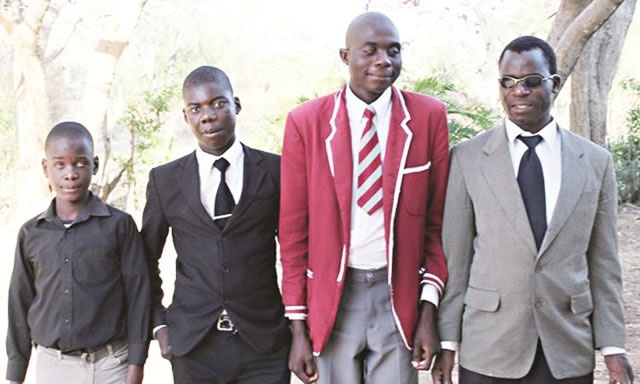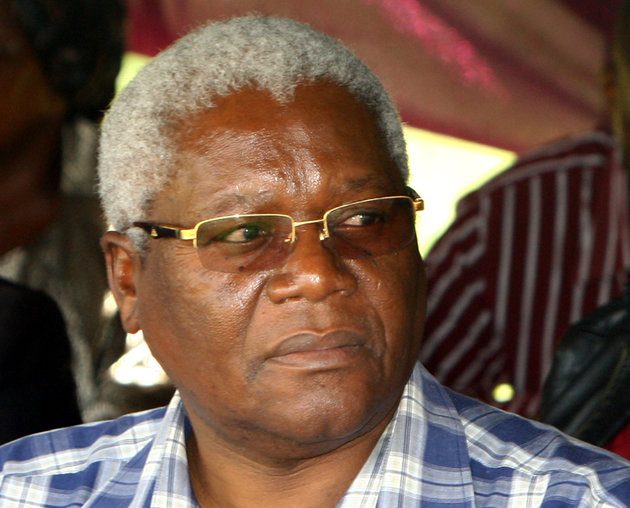People with disability need education, skills empowerment


A visually impaired teacher at Solusi Adventist High School, Pastor Happy Gomba (right), with pupils Tapelo Nyathi, Obvious Sibanda and Zwelibanzi Dube
Sukulwenkosi Dube Plumtree Correspondent
“DISABILITY is not inability”.
This is what three visually impaired pupils have demonstrated as they continue to excel in their studies despite the challenges they face in their learning process.
Twelve-year-old Tapelo Nyathi, a pupil at Solusi Primary School in Bulilima District, said the learning process has never been easy for him but he has managed to adapt.
He was born blind and at the age of five years, he enrolled at the school.
Tapelo said when he started school he had one goal in life which was to prove that he was not different from his peers who have their eyesight.
Narrating his class experience, Tapelo said he was one of the two visually impaired pupils in a class of 42. He said when a teacher stands before the class and conducts a lesson he and his classmate take down their notes in Braille.
He said he and his friend did not have the priviledge of observing illustrations given by their teacher on the chalk board and as a result they had to listen attentively.
Tapelo said on days when they are given tests to write a teacher who specialises in Braille collects his work and translates it to the normal writing and gives it to their class teacher. He said when their teacher issues them with notes their Braille teacher translates the work and gives them to read.
“Our greatest challenge that we have as visually impaired pupils in our school is of text books. Our peers who can see have books that they use for learning but the books that we use are out of syllabus.
“As a result we depend largely on what the teacher gives us or sometimes our peers share the information they would’ve read with us,” said Tapelo.
He said despite these challenges he had learnt to make do with the limited resources available.
Tapelo posted first place in his class last year third term. He was also appointed to be the deputy head boy of the school after his teachers noticed the great potential he has.
Twenty-year-old Obvious Sibanda, a Form 3 pupil at Solusi High School said he started school at the age of 10 as his family believed he would not excel as he was visually impaired.
He said he grew up in Somnene area and his parents kept him hidden most of the time as they saw him as an embarrassment.
Obvious said they always kept him under a granary which was at the back part of the yard so that he would not be seen by passerbys and neighbours.
“My father deserted us immediately after I was born as he was denying that I was his child. I was told that he told my mother to remain behind and raise her useless child alone who is me just because I was blind.
“I grew up under the care of my mother and my siblings and my mother insisted that I spend the whole day under the granary,” he said.
Obvious said a teacher at a school close to his home area spotted him where he was always hidden and made enquiries about his lifestyle.
He said she was the reason why he attended school as she encouraged her mother to seek help to put him through school. Obvious said the teacher also convinced his mother that he could excel in school despite being visually impaired.
He said he started his Grade 1 when he was 10 years old because of the delay he had gone through. Obvious said he managed to obtain 11 units in his Grade 7 final exams while last term he passed seven out of the nine subjects he is doing.
“I’ve proved that those who doubted my capability in school were wrong because I’m able to learn with the rest of the children. I was recently appointed a prefect at school which shows that I’m capable of living like any other child,” said Obvious.
He said his greatest tools that he used at school when learning were his ears. He said he was performing well in class when compared to his classmates who were priviledged to observe illustrations given on the board in addition to the spoken explanation.
Another Form 1 pupil at the school, Zwelibanzi Dube, 20, said he was also able to learn despite his sight problem. He said he obtained 10 points in last year’s Grade 7 exams.
He said he was confident that he would excel in school and he aspired to be a lawyer. Zwelibanzi said he believed that a disabled person could qualify for almost any profession through dedication and hard work.
He said he felt priviledged to be learning as he knew that there were some disabled children who were being deprived the chance to learn just because of their condition.
“The least that we can be given as disabled children is a chance to prove ourselves. If only schools can accommodate us even more and make the learning environment favourable to us so that we can see that they believe in us,” said Zwelibanzi.
A visually impaired teacher at the school, Pastor Happy Gomba, said the greatest opportunity that children with disabilities had to get was of education.
He said it was unfortunate that parents and relatives were the first people to stigmatise their children who are born with disabilities.
Pastor Gomba said some parents were depriving their disabled children of a chance to learn as they assumed they would fail.
“It’s sad because some people tend to think that sending a disabled child to school is a waste of resources. In actual fact it’s one of the greatest ways in which one can empower those children,” said Pastor Gomba.
He said if visually impaired pupils could excel in school with limited resources then they would do even better when furnished with adequate resources.
Pastor Gomba said parents often overlooked the need for them to send their disabled pupils to school.
“In many cases parents view the act of sending their children to school as a form of investment. If a child is disabled some parents think they’d be wasting money if they send him or her through school.
“They assume that a child who is disabled is useless and as such can’t do anything progressive even after being sent through school. Actually this isn’t the case and parents should learn that they should be proud of their disabled children rather than concealing them from the world,” he said.
He said as a teacher he sometimes found it difficult to acquire textbooks in Braille. He said as a result he relied on his wife to read out the contents in textbooks while he jotted down his notes in Braille which he used to teach his class.
Pastor Gomba said he was able to conduct lessons just like all the other teachers in the school.
He said disability was a condition which could happen to anyone at any given time but it should not be used as an excuse for failure.
He said he became blind when he was six years old but that did not stop him from excelling as he recently acquired a degree in Theology and Education which helped him to secure the teaching job that he has.
He pointed out that there was a need for schools to make use of technology to improve the learning process of disabled persons and a need to have current textbooks.
Senator Anna Shiri who represents the National Council of Disabled Persons of Zimbabwe in Parliament recently pointed out that people with disabilities had to be empowered through education so that they do not become charity cases that rely on handouts.
She said they needed to be empowered through both formal education and vocational skills development.
Sen Shiri also urged parents to educate their disabled children so that they would relate and interact well with their peers. She also said education was crucial in ending poverty among disabled persons.
Headman Sikhathini from Bulilima District pointed out that a number of disabled children from his area were not attending school.
He said this was partly because there were no schools nearby to accommodate some of the pupils who had special needs. On the other hand he said parents were reluctant to send their disabled children to school.
“There’re about 11 disabled children from my area who’re still of school-going age but they aren’t attending school.Parents think that just because they’re disabled means they aren’t capable which isn’t true.
“In other cases parents find it difficult to send their disabled children to school because they aren’t mobile.Some crippled children don’t have wheel chairs and they spend their time seated,” said Headman Sikhathini.











Comments